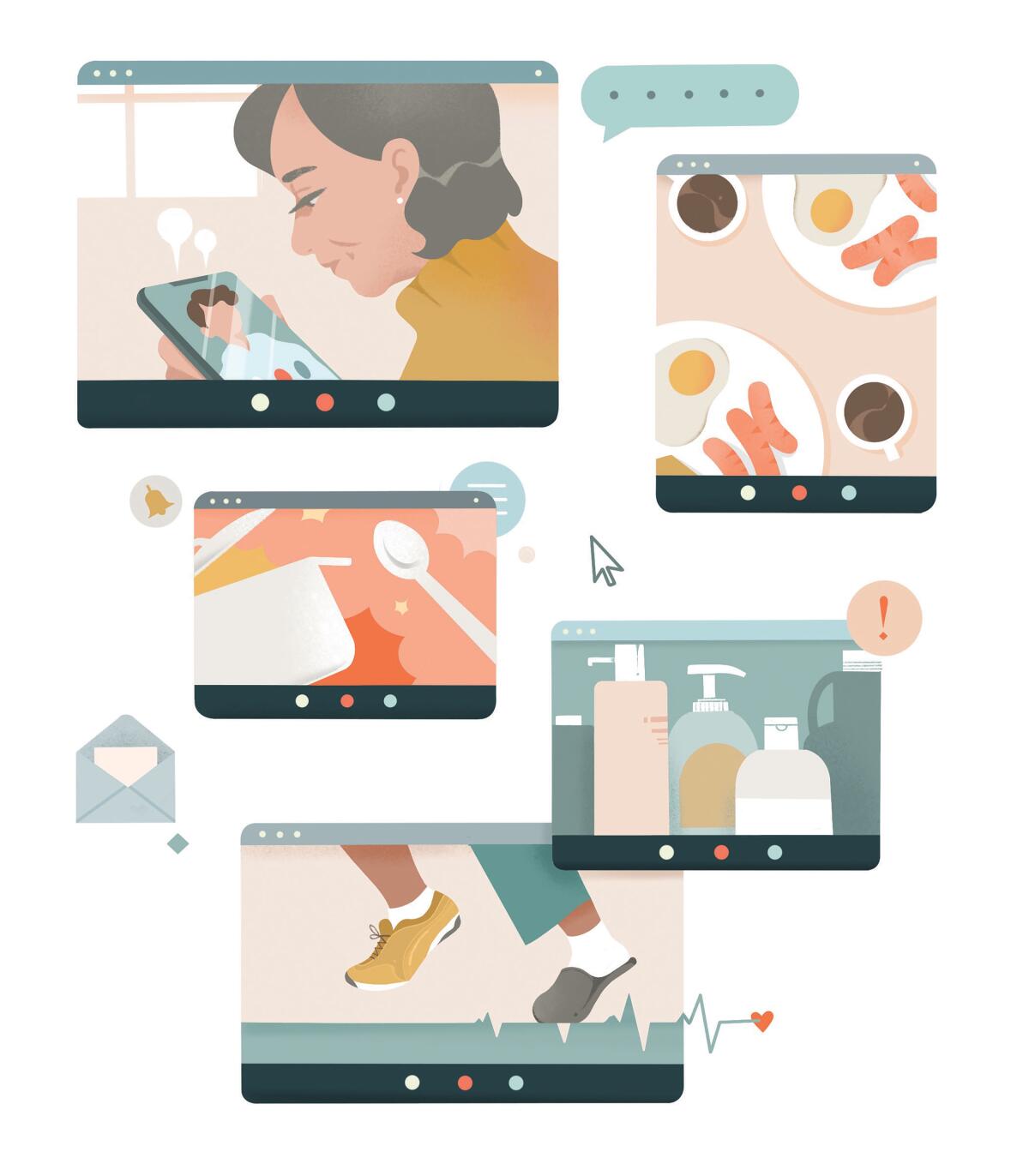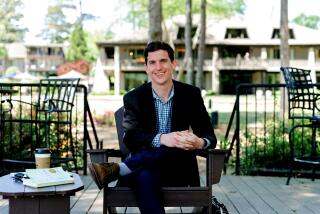Op-Ed: Dispatches from the pandemic: coronavirus togetherness, a nightly ritual, keeping focus in the ER

In the ER, no room for distraction
By Mark Morocco
The other day, during my “social distance” run, I fell.
I’ve been a diligent runner for 30 years and have fallen maybe 10 times. It’s always for the same reason. I get distracted, lose my form and — bam! — I’m on the ground. Distraction every time.
Once it was the woman who tipped a stroller holding a tiny dog; another time a squirrel, his head stuck in a yogurt container, wandering like a blind drunk into my path.
I’m a month away from 60, and I work in the emergency room of one of L.A.’s university hospitals. It is a young doctor’s game, but I’ve been able to keep my legs and heart strong, lungs and brain clear.
Because of COVID-19, there is a layer of protective gear I put on now before I see a patient (or “I must wear every second of my eight-hour shift?”). Donning the personal protective equipment, or PPE, requires a precise set of steps aimed at protecting me from getting sick or making someone else sick. There is no room for distraction.
After a week of the “new abnormal” I’ve got my PPE form down. New gloves over washed hands fit an N95 mask over my mouth and nose, then over my head a face shield covers from my glasses to my neck. The gloves are sanitized again and a yellow gown wraps my neck and waist, then a second pair of gloves goes over the first. A fresh paper mask protects the essential N95 from adjusting fingers or an errant sneeze — if touched, it will have to be thrown out. Another squirt of hand sanitizer protects my glove from the doorknob as I go in to see the patient.
It’s exhausting but if I stay in good form, every moment of my shift, I can do this. I may still get the virus, but I’ll know I did everything I could to “bend the curve” in my favor.
You need to help me. You, too, need to concentrate, to avoid distraction by fear or anxiety or boredom. Distraction could cause you to do something that puts us both at risk.
For you, good form involves doing exactly what is recommended: social distancing, hand washing, self-isolation if sick, covering your cough with a mask or a clothed elbow. Comfort your loved ones by phone or Zoom or Skype. Exercise, laugh, sing or just rest. Stay off social media, where rumors and half facts light fires of anxiety. Just turn it off. You’ll feel better.
Training is hard, but you’ve got this: Every time you move, check your form before you take a step: Is this trip really necessary; am I really six feet away from that other shopper?
And if you get sick and are feeling terrible, isolate yourself and ride it out at home. Don’t go to the ER unless you’re feeling worse than you ever have before; unless you’re so short of breath you get confused or you can’t imagine how to get from your bed to the bathroom. And if at that point you call 911, tell them about your symptoms so they can bring you in using the correct form, protecting you, them and us.
Short of that, avoid distraction and run along with me, step by step (10 feet apart!)
With clear heads and focus, I am certain we can finish this marathon without a scratch. Keep your form up and don’t watch that squirrel.
Mark Morocco is a physician and professor of emergency medicine, a former medical supervisor for NBC’s “ER,” and a two-time L.A. Marathon finisher.
::
Sharing my OCD
By Brett Murphy Hunt
Coronavirus “precautions” eerily remind me of my 5-year-old self refusing to touch the Band-Aid box in kindergarten because another student touched it after cutting his finger and what if his blood got on the box and then that got on me?
“Social distancing” feels a lot like struggling to live in a college dorm because the student two rooms down had MRSA on his arm and hung out with my roommate, in my room, just hours prior. And by struggling I mean crippling, bricks-on-the-chest, reduce-you-to-rocking-in-a-corner struggling.
In the time of the coronavirus, it can be a fine line between a pathology and a reasonable response. For obsessive-compulsive disorder sufferers like me, it’s as if we are enduring times we have been preparing for our whole lives.
I’ll tell you what, though. This has all been validating on some level. These skills — skills that require a level of rigid meticulousness formerly unfamiliar to the average person — have suddenly and unexpectedly come in handy.
The pandemic has justified germ tracking and avoidance. “Being diligent,” you might even call it. But what would you have called it four months ago? In a matter of days, the very habits that I’ve tried to therapize and medicate out of existence in my life have been reinforced in a way that has been troubling to reconcile. OCD is creeping back, her alarm bells clanging increasingly louder.
With hawk-like precision, I’m snapping back into following and squashing the microbes introduced into my home. It’s as if I’ve never stopped (or, if I’m honest, just reduced the frequency). Privy to the myriad ways in which the parade of pathogens can march on — in takeout boxes, fingertips, sneaker bottoms, puppy paws — I enlist my talents once more.
I make spritzes of sanitizer rain down to stop the continuation of the contamination; germ-vigilante status is activated. The familiar pressure looms of trying to pretend like I’m just doing normal cleaning, but I can stop only when I can taste the Lysol in the back of my throat. And the familiar nagging thoughts of just one more spray until it feels right only compound the problem.
Credible instructions warn: “Wash your hands. With soap. Wash them again.” Our reasonable selves know that 17 times is probably too much, but what about three? Is that cautious or overkill? The line has become more elusive than ever. Am I being nuts or conscientious? Tough question to answer right now.
Social media posts volley back and forth about the ways in which the coronavirus is a stern admonition from our Earth: Keep hurting me and this is what you get. Maybe we OCD sufferers felt this vibration before others. Maybe we check and check because it’s hard to ever feel safe on this planet; maybe we clean and clean because somehow we knew in our bones this was coming.
Either way, like anything, this too will pass, and in a post-COVID19 world, our tendencies will be deemed a definitive pathology once more.
But an obsessive-compulsive disorder cannot be switched on when it’s convenient and switched back off when no longer needed.
No.
It doesn’t work that way.
Brett Murphy Hunt teaches in the MBA program at Assumption College in Worcester, Mass., and English at Northeastern University in Boston.
::
What a tidy virus
By Amy Goldman Koss
We boomers all wondered what would become of us when we got old. There are so many of us and we’re not the most patient or selfless generation. We dealt with our own aging parents as best as we could but dearly hoped there’d be a better way to fade by the time it was our turn.
And the money to pay for it. And the drugs to make it fun. Until then, we lived in a glorious time.
We reached sexual maturity in the sweet spot between the introduction of the pill and the onset of AIDS. We turned everything that had once been metal and wood and fabric into colorful, lightweight, easy-to-care-for plastic. Free time became a right and we filled it with all the pleasure and convenience we could manage. We believed there was an “Away” to throw things and a solution to every problem. We flew and drove wherever we could afford to go, as often as we got the chance. We now see that we indulged at the planet’s expense, but at the time our ignorance spared us any guilt.
Meanwhile, our children even before COVID-19 were struggling in ways we never did. And while they struggle, often living in our garages and guest rooms, we remind them that we were self-supporting by their age but take no responsibility for their plight.
And now, to protect us, they are asked to lock themselves in and shut their lives down.
Social media tell them that by simply standing too close, or handing us something without washing their hands, through no incriminating fault of their own, they could eliminate our entire cumbersome, preachy, bossy, arrogant, expensive generation. They’d inherit the much-needed funds we elders have been hoarding for our golden years.
What a tidy virus! Maybe I’m projecting, but would we have gone out of our way to protect the old when we were young? How much did we honor our dithering great aunts, sitting bowlegged in support hose on the hard chair at the holidays? Or the uncle who stood too close and offered “helpful” advice at length, or the grandmothers who commented on our changing bodies. How much would we have missed the uncle who insisted on telling us how much everything used to cost? Well, like it or not, we are them. We are our parents’ friends who thought they were still young and wanted to relate to us, and we are the ones who didn’t bother. We are the bosses who treated us like crap.
And if a terrible new disease had come along back then, that was unlikely to kill us or our friends, but might carry off Uncle Harvey, or cousin Rhoda ... Would we have sung the birthday song twice while washing our hands, every single time?
Amy Goldman Koss is a contributing writer to Opinion and the author of numerous books for children and young adults.
::
Binary confinement
By Barry Goldman
An inmate at a Michigan prison once told me, “You want to know what it’s like to live in a two-man cell? Lock yourself in the bathroom with your wife for the weekend.” Evidently, we are all about to find out what he meant.
In Michigan, the lockdown ordered by our governor prohibits “all public and private gatherings of any number of people occurring among persons not part of a single household.” And we have been ordered to stay at home.
That means my wife and I, and millions like us, have entered a period of what we might call “binary confinement.” It’s like solitary confinement, but you do it with your spouse. It will be interesting to see how that works out.
In a way, binary confinement is the opposite of solitary confinement. The problem with solitary confinement is too much aloneness, and the problem with binary confinement is too much togetherness. But in another sense the problem is the same. It is “uneventfulness.”
Arthur Koestler, the author of “Darkness at Noon,” was held in solitary confinement by loyalist forces during the Spanish Civil War. The great paradox, he says, is the difference between the passage of time as it is lived in solitary confinement and the same period of time as it is remembered. As solitary confinement is experienced, time crawls through “the most absolute degree of uneventfulness imaginable.” As it is later remembered, it seems to have gone by in a flash. Why? Because nothing happened.
In my house we get up, eat breakfast, walk the dog, feed the horses, eat lunch, walk the dog, feed the horses, eat dinner, read, go to sleep. Repeat. How long has it been? A week? It seems like at least a month.
The ordinary irritations of life in close quarters with another human being are magnified when there is nothing else going on. My wife gets her news from NPR. I get mine from print. My way is silent. Hers is not. They are, to use a technical term, “incompossible.”
I like my wife better than I like anyone else in the world, but even under ordinary circumstances she can get on my last nerve. And these are not ordinary circumstances.
Albie Sachs, one of the heroes of the struggle against apartheid and later a judge on the Constitutional Court of South Africa, spent some time in solitary confinement. After he was released, South African security forces planted a car bomb that blew off his arm. When he woke up in the hospital and learned what had happened, his reaction was joy. He wasn’t back in solitary confinement!
Sachs says no one who hasn’t been in solitary confinement can know what it is like, and once you have been in it, you never completely get out. We are all about to find out if the same is true of binary confinement.
The bright side, if there is one, is that when this period of forced uneventfulness is finally over, it will seem to have gone by in a blink.
Barry Goldman is an arbitrator and mediator in Michigan. He is the author of “The Science of Settlement.”
::
A neighborhood’s ritual
By Sue Horton
Chuck has always been a chief organizer of events on our dead-end block in the hills of Echo Park — potluck brunches to welcome new neighbors, an annual house-to-house cocktail party, gatherings to talk about earthquake preparedness.
So, it was no surprise that Chuck was the one who rallied us when the coronavirus restrictions hit.
On March 19, he sent a note to the entire block, checking to see how people were holding up. “If you want to respond, he said, you can do so to me or hit reply all…. Not responding is all right too.”
Responses came quickly: greetings, offers of help, reassurances that all was well and that everyone was taking the social-distancing orders seriously. In the midst of the back and forth, Chuck proposed an idea. “Hootin and Hollerin’ at 8 p.m.?!,” he wrote. “I have a loud bell, but I cannot yell like I used to.”
That night at 8, we all emerged from our houses. Some people went into the street to make noise with bells or musical instruments or pan lids, even the children taking care to maintain at least 6 feet of distance. Others came out onto balconies or stayed behind fences. But we all made noise, called out greetings and laid eyes on one another.
Then Chuck led a round of applause for those on the front lines of the crisis, and five minutes after it all began we were back inside.
The hullabaloo has continued every night since, at precisely 8 p.m. Once, when rain was falling, we gathered by Zoom, and Chuck’s wife, Carolina, read a short story. Another night, Chuck read Shakespeare’s 89th Sonnet from his balcony. My husband and I both look forward to the nightly interlude, taking care to time dinner so it doesn’t conflict.
I’ll certainly be glad when normal life resumes, and we can all be wherever we want to be each night. But I’ll also miss the 8 o’clock ritual of neighbors coming together, simply to reassure ourselves we still exist and are in this together.
Sue Horton is the Times Op-Ed and Sunday Opinion editor.
More to Read
A cure for the common opinion
Get thought-provoking perspectives with our weekly newsletter.
You may occasionally receive promotional content from the Los Angeles Times.










